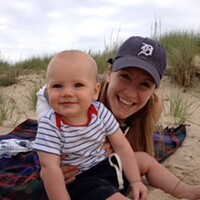Baby spas: Can we coddle too much?
Loading...
Business Insider wrote about a baby spa in Houston, inspired by other spas like it in the UK that encourage neonatal development, motor skills, and even promote relaxation techniques for young babies.
The gist of the whole baby spa experience? Your baby, between the ages of two and eight months, floats in a heated tub with a floatie ring around their neck to keep their head above water for up to 20 minutes. Parents also learn neonatal massage techniques for their baby. The entire experience costs $65 and lasts about an hour.
Turns out, Business Insider was late to cover the first (and allegedly only) baby spa in the US, called appropriately, FloatBabies.
The Today Show, as well as USA Today have already reported on FloatBabies, which, according to Business Insider, has already welcomed 330 clients and their parents since it opened in February.
Call me cheap, call me unfair, heck, even call me irresponsible for not encouraging my child’s soaking habits at an early age, but I am torn as a parent, and feel like this is an appropriate place to draw the line.
It seems to me that modern parents such as myself are being pulled back and forth between two distinct parenting approaches - hands-off and, in this case, hands massaging after a relaxing soak.
Many parents have complained about how the their peers are too hands on, while meanwhile, businesses are sprouting up catering to “Tiger” and “Helicopter” parents who often seem to be measuring their own worth on the success of their kids.
To each is own, and I will admit that a baby in a floatie ring is super cute (seriously, the only thing cuter would be puppies in the water too), but parents need to find balance.
I don’t doubt the benefits of the spa or the massage, and I am with those who encourage early and often movement of babies, with water being a great opportunity for babies to learn to move before they can crawl. I skipped swings and saucers for my own son early on in favor of tummy time and swim lessons when he was an infant.
And I will label myself as a more hands-off parent. Perhaps part of that stems from the fact that my son started both crawling and walking relatively early, according to the “experts” that tell high-strung first-time parents what should be happening when.
Along that same vein though, how much are businesses for babies catering to new parents searching for “expert” advice, only to ask them to spend money that might be better saved for, perhaps, college or even a good family vacation in a location with a heated pool?
According to a recent USDA report, the cost of raising a child born in 2013 will exceed $245K before parents even send them to college.
Applying a version of the famed “latte factor” by David Bach to this scenario (multiplying the cost per visit times how many visits to calculate what money you could save), skipping the spa could buy a parent a lot more lattes.
In all seriousness though, parents need to remember to look past the hype of the latest baby “thing” and follow their instincts on what is best for their child. If that includes the floatie ring, please don't forget to snap a picture and post it on Facebook for the rest of us to enjoy. I’ll look at it while sipping my latte.








